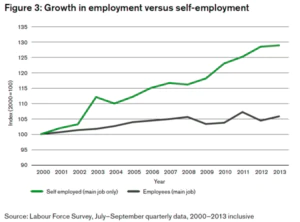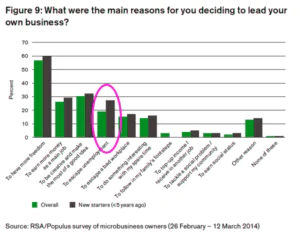June 2nd, 2014
The self-employed will soon outnumber the public sector workforce, according to a new report.
The report, authored by the Royal Society of Arts, Manufactures and Commerce (RSA), found that the self-employment market in the UK is growing at a remarkable rate. There are now 600,000 more microbusinesses since the recession, and as of 2000, the number of people who work for themselves has increased by 30 per cent. The report concluded that one in seven workers are now self-employed. The RSA estimate that if employment trends continue on this path, the number of people that are self-employed (5 million) will outnumber the public sector workforce (4.9 million) by 2018.

The registered charity said that there are several demographic groups that are becoming more noticeable in this area of employment. The number of women who have turned to self-employment is double that of men in recent years. It has additionally become a popular choice for both the older and younger generations. There has been a 140 per cent increase in the number of over 65s going it alone, while a significant fall in the number of under 25s going in to traditional work since 2000.
The report takes an in-depth look in to the self-employment workforce and the individuals involved. The researchers focused on the drive that is increasing this market, how the community is evolving and the life satisfaction for those who work for themselves.
One aim of the research was to look in to myths that surround the self-employed. The first myth challenged was the belief that the majority of people are forced in to this area of work to escape unemployment. Although a correlation between these two does exist, the report revealed that only 27 per cent entered this realm of work because of that reason. Another myth investigated was that most of the newly self-employed were low skilled, doing odd jobs to make ends meet. But the data revealed that in fact the biggest increase in the last 6 years has come from professional occupations.

In addition, the research found that those who work for themselves are isolated, paid less and work longer hours. The self-employed earn on average 20 per cent less, compared to those who are in conventional jobs and the number of self-employed that work over 50 hours per week is double that of regular employees.
The report stated that 40 per cent think working alone leaves them feeling disconnected from the rest of the world. Although a worrying statistic, those who work for themselves appear to be more content and happier overall. 84 per cent agreed to being more satisfied and less than 5 per cent would consider going back to other employment.
Benedict Dellot, senior researcher at the RSA, reflected on the report, “The fundamental lesson from our research is that we need to learn to live with the self-employed. Yes, there are a substantial number who are forced into the position, but there is little doubt that the vast majority enjoy being their own boss – and understandably so.
“At present, however, many commentators like the TUC have failed to recognise this, and seem to want to hark back to a golden age when being an employee in a large organisation was the norm.”
This report is the first of three looking in detail at self-employment. It is part of the project “The Power of Small”, launched at the end of last year by the RSA and Etsy.
Article By: Ratchelle Deary, Marketing Executive at Contractor Mortgages Made Easy
Media Contact: Raman Kaur, Public Relations Manager
Tel: 01489 555 080
Email: media@contractormortgagesuk.com



